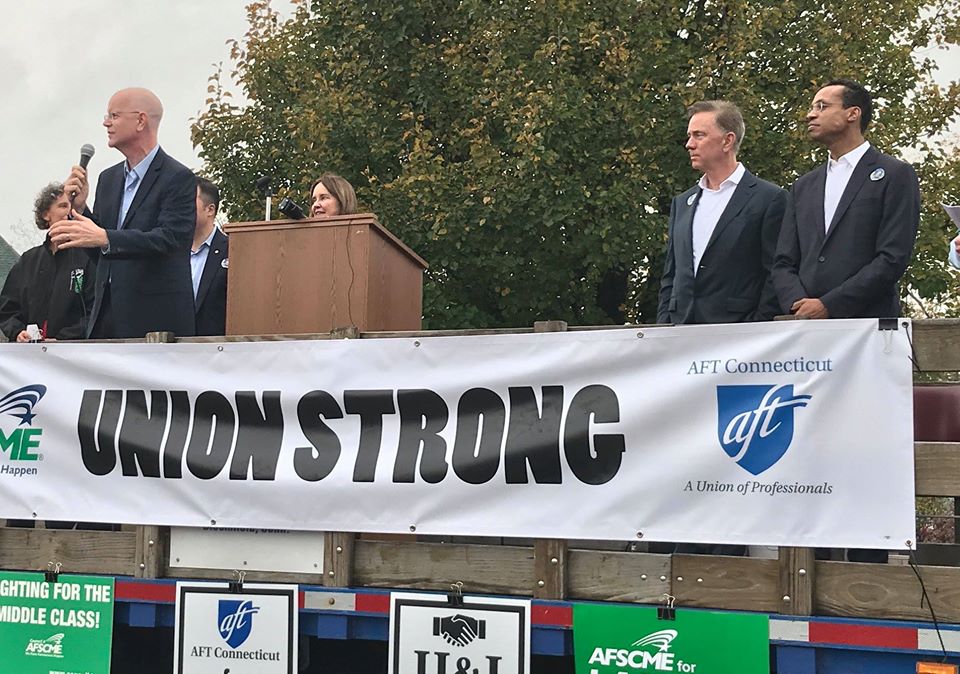Connecticut union activists are planning a drive-by rally outside the homes of Connecticut’s wealthiest individuals in Greenwich on Thursday, May 21, calling for increasing taxes on the rich to plug an estimated $7 billion budget gap in coming years.
The “Tax the Rich to Save Our Lives Protest” is scheduled to meet at the Greenwich train station at 1 p.m. and will then “take over Greenwich, CT, stopping at the homes of some of the state’s wealthiest residents, calling for billionaires and big corporations to pay their fair share of taxes during the COVID-19 crisis,” according to an event invitation.
“Please join union members from Connecticut and New York as we raise our voices to demand a progressive tax system that raises money from billionaires and the super-wealthy, not working people; increased investments in healthcare, education and infrastructure, not cuts to public services and no privatization,” the notice reads.
The drive-by protest comes following a media push by the General Assembly’s Progressive Caucus and the Connecticut AFL-CIO to increase the top income tax rate to prevent government spending cuts as tax revenue plummets during the COVID-19 pandemic.
While unions and progressive leadership have been pushing for higher tax rates on the wealthy for years, the pandemic has resulted in a budget crisis that affords them the opportunity to push through a fourth income tax increase on the top bracket since 2009.
Gov. Ned Lamont, himself a wealthy Greenwich resident who was heavily supported by Connecticut’s public sector unions during his gubernatorial campaign, has thus far resisted calls for increasing taxes again.

Despite Connecticut’s hefty Rainy Day Fund will likely run out within a year, according to state government estimates, creating a budget crunch for the next biennium.
The governor has indicated that he will ask Connecticut’s public sector union for help with the budget, but union leaders have indicated they are resistant to any concessions.
Connecticut is currently under an umbrella union contract with the State Employee Bargaining Agent Coalition that governs retirement benefits until 2027.
Connecticut’s unfunded pension and retirement healthcare liabilities are part of the state’s rising fixed costs that have been plaguing the state budget for years and will now be exacerbated by the economic downturn.
Progressive Caucus member Rep. Anne Hughes, D-Easton, downplayed the idea that the wealthy may decamp for lower tax states like Florida during the pandemic.
“Where are they going to flee to? Florida, where they’re going to get infected?” Hughes said.
According to the CDC, Florida with a population of 21.4 million has 46,442 cases, compared to Connecticut with a population of 3.6 million and 38,116 cases. Connecticut has more than two times as many COVID related deaths as Florida, according to the CDC.
Connecticut has lost some high-profile billionaires to Florida in the past, including Paul Tudor Jones, Barry Sternlicht and Edward Lampert.
Data from the Internal Revenue Service show that individuals earning over 200,000 per year – the highest income level they track – make up the largest portion of lost income to other states.
Florida is consistently the beneficiary of people moving out of Connecticut.
Although Fairfield County has been a Connecticut hot-spot for COVID-19 infections, wealthy individuals and families trying to escape the city have shown a renewed interest in purchasing real estate in Connecticut.
This is not the first time unions have held protests outside the houses of Greenwich residents.
In 2017, unions and the Working Families Party held a “Lifestyles of the Rich & Shameless” protest outside the homes of wealthy individuals like hedge fund billionaire Ray Dalio. The protest included erecting a giant inflatable rat.
“Healthcare workers, teachers, and community leaders will speak about how the richest people in the state are getting richer from the COVID-19 pandemic while frontline workers face massive shortages of PPE and Northeast states, including Connecticut and New York face the threat of massive budget cuts and layoffs,” the notice says.
Under the terms of the 2017 SEBAC agreement, state employees are set to receive a second 5.5 percent raise in July and have layoff protections until July 2021.


James McAuliffe
May 20, 2020 @ 2:00 pm
Speaking of pensions;
I emailed the CT Treasurer’s department because the Pension Fund Performance pdf was stale showing 1/31/2020. Responding to my email they updated it to 3/31/2020
I have noticed that the official web pages of the officers of CT often are self promoting and unduly optimistic. It is interesting to see the last annual report from Shawn Wooden
January TERS balance – 19.2 January SERS balance – 13.8
March TERS Balance – 16.3 March SERS balance – 11.9
Total market value loss from Jan 31, 2020 to March 31, 202 = 4.8 BILLION! No discussion about this on the Treasurer’s site.
PS: The market is up ~ 20% since 3/31 so if they were up to date the picture today would not be as bad as 3/31
Regards,
Jim
Thad Stewart
May 26, 2020 @ 2:04 pm
What is the problem here? These deals cut with the unions were “pie in the sky” from before the ink was dry on the contract. This is precisely why America has a tough time competing in an open market. Never done on time and billions over budget.